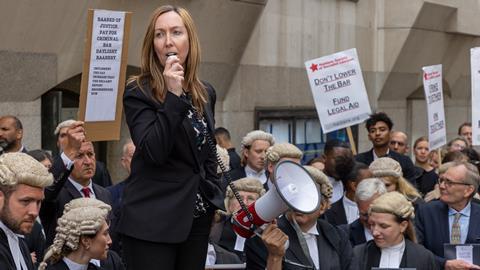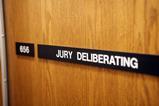Criminal barristers stepped up their direct action over legal aid rates this week by walking out of courts across England and Wales. Their ‘strike’ appears rock-solid, but the government has given no indication yet that it is willing to come back to the negotiating table
Fed up and exhausted. Overworked, underpaid and taken for granted despite their critical contribution to the criminal justice system, hundreds of criminal legal aid barristers across the country began strike action on Monday.
‘We are engulfed in a crisis of epic proportions, which has brought almost to a standstill a system that we all love,’ declared Criminal Bar Association chair Jo Sidhu QC outside the Old Bailey, the country’s most high-profile criminal court. For the criminal bar, which lost 300 colleagues last year alone, the government’s proposed £135m reform package is not enough to save the criminal defence sector from collapse.
Legal aid lawyers are paid so little, Sidhu said, that by the time they come home in the evening, they have less money in their pocket than when they started the day.
He was not exaggerating. 9BR Chambers’ Emma Heath told the Gazette she is currently spending £162 on a return train ticket for a case. ‘I would not, as a right, get that money back. I have to apply to get it back.’
2 Bedford Row’s Jessica Ward noted that self-employed barristers do not get paid until the resolution of a case – yet they are waiting ‘literally years’ for trials to come to court.
Ward has a case where the offence allegedly took place in 2018. The trial should have been held in January 2021 but was pulled from the list. It was finally meant to start last week but was pulled from the list the Friday before and rescheduled again for late 2023. Ward has spent many hours preparing the case but will not get paid until the trial has concluded. It is not just Ward who is affected – witnesses might may have taken time off work to give evidence.
9BR Chambers’ Katie Mustard added that barristers will be turning down work to make sure their diary is clear to cover trials, so when a case is suddenly pulled from the list, they are left with nothing but an empty diary.
Justice secretary Dominic Raab called the strike action ‘regrettable’ and urged barristers ‘to agree the proposed 15% pay rise, which would see a typical barrister earn around £7,000 more a year’.
But according to Sir Christopher Bellamy’s criminal legal aid review, newly qualified criminal barristers’ median income from public criminal fees after expenses (such as chambers’ rent, travel costs and tax) ranges from £9,000 to £10,300. So, when barristers say they are often earning less than the minimum wage, they are telling the truth.
Doughty Street Chambers’ Laura Stockdale (pictured, opposite) said she had lived in London during her pupillage but could no longer afford to pay the rent and had to move back in with her parents. She recalled a case where there was an issue with the charge. Had it not been for her work, the defendant would have wrongly served a longer sentence. The case involved 10 hours’ work, two hours’ travel and four hours at court. ‘We are making sure justice is done for victims and defendants,’ she said. Yet Stockdale was paid a total of £126, which works out at £7.88 per hour. The national living wage is £9.50.
'The only way we can sustain [our practice] is by running on small margins and regrettably turning away certain categories of work – something we would never have dreamt of doing… starting our journey in 2002'
Jonathan Black, BSB Solicitors
The situation is equally dire for solicitors. Many turned up at Monday’s demonstrations to express support and solidarity.
‘I’m a criminal solicitor and I stand with my colleagues, the criminal bar, shoulder to shoulder,’ declared Kerry Hudson, a former president of the London Criminal Courts Solicitors’ Association, to huge applause and cheers outside the Old Bailey.
‘We don’t ask for much. We are criminal legal aid solicitors, not commercial solicitors. We work on minimum wage, often we make a loss on the work that we do… We are here, putting our blood, sweat and tears into this job because we care about what we do. If we didn’t, we’d all quit and we’d all get jobs in the magic circle firms.’
The Bellamy review said criminal legal aid firms were unable to attract sufficient new blood because the fee levels restricted the salaries that could be offered. Neither could they retain experienced practitioners because of the higher salaries offered by the Crown Prosecution Service.
‘Fee levels have been cut, and there has been no increase for many years. In real terms, fees have declined by about one-third from 2008, and many fees have remained the same for 25 years. Profits too have declined, to a level well below those in other areas of legal practice and are, at present, unlikely to incentivise new investment in the sector or compensate the business owners for the risks to which they are exposed,’ the review said. ‘This situation has also led to a significant imbalance between the resources available to the defence as compared to the prosecution, undermining the principle of equality of arms.’
Solicitor Jonathan Black’s firm, BSB Solicitors, which specialises in criminal defence work, turns 20 tomorrow. Black and his colleagues have seen the cost of running a practice increase while fees have remained static at best.
‘The only way we can sustain it is by running on small margins and regrettably turning away certain categories of work – something we would never have dreamt of doing as idealistic young [lawyers] starting our journey in 2002,’ he said.
Bellamy advised that £100m of his recommended £135m should go towards remunerating criminal legal aid firms so they can invest in recruitment, compete for talent, maintain quality, provide training and ensure retention. Under the government’s reform package, firms will receive an annual uplift of £58m-£66m.
Furious, many criminal defence solicitors are boycotting poorly paid burglary cases. That boycott could soon extend to assaults on emergency workers, stalking and harassment.
Regulatory obligations and contractual requirements make strike action more awkward for solicitors. The Law Society and practitioner groups cannot call for solicitors to take collective action, as doing so could breach competition law. But the future is looking so bleak, LCCSA president Hesham Puri said, some members have been talking about walkouts.
Wigged and robed barristers will pick up their placards again next Monday in the hope of bringing the government back to the negotiating table but also to explain to the public why they are resorting to industrial action.
Asked about the strike action on Sunday, Northern Ireland secretary Brandon Lewis told Sky’s Trevor Phillips that many people did not feel barristers were underpaid.
If the strikes continue, it is at least possible that it will be the government that loses public sympathy. The court backlog will get worse, with victims and defendants having to wait even longer for justice. And the public may finally discover the truth about how much criminal legal aid lawyers actually get paid.
Pictured above: Kerry Hudson, solicitor and director of Bullivant Law. Image credit: Jonathan Goldberg





































1 Reader's comment